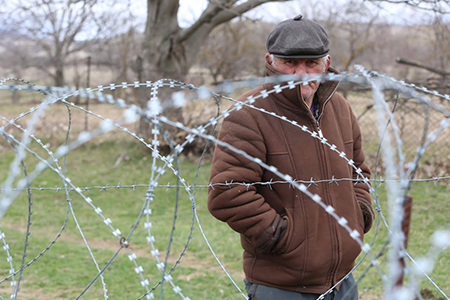9 people kidnapped in 33 days for crossing occupation line

An Incident Prevention and Response Mechanism (IPRM) meeting was held today in Ergneti village several kilometers away from the Russian occupied Georgian region of Tskhinvali (South Ossetia), where security conditions along the occupation line were on the top of agenda.
Nine cases of kidnapping along the occupation line between Georgia and its breakaway Tskhinvali region have been reported since the previous IPRM meeting on March 2.
Safe transportation of the local population living along the occupation line is always among the main topics regularly discussed at the IPRM meetings both in Ergneti and Gali in Abkhazia, another Russian occupied region of Georgia.
It is not always obvious where the occupation line has been demarcated as Russian occupation forces keep changing the so-called borders. This process is informally referred to as "creeping occupation.”
Russian border guards often detain those who intentionally or unintentionally cross the so-called border at locations that do not have barbed-wire fences.
Detainees are then usually released after their families pay a fine. The Georgian State Security Service says that this fine is generally around 2,000 rubles, which is about 88.80 GEL or $35.8 dollars or €34.02.
The illegal detention of Georgian citizen Giorgi Giunashvili back in 2016 was one of the issues discussed at today’s meeting in Ergneti as well.
Last month, an unrecognised court in Georgia's Russian-occupied Tskhinvali region sentenced Giunashvili to 20 years imprisonment.
Demanding Giunashvili’s immediate release from detention, IPRM participant Kakha Kemoklidze, who is the Deputy Head of the Information-Analytical Department under the State Security Service, calls Giunashvili’s sentence "inventory.”
The IPRM was created in February 2009 following the 2008 Russia-Georgia conflict to address security concerns and ensure the protection of human rights in the occupied regions.
 Tweet
Tweet  Share
Share